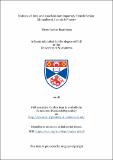Files in this item
Notions of time and epoch in contemporary French fiction : Montalbetti, Lenoir & Pireyre
Item metadata
| dc.contributor.advisor | Hutton, Margaret-Anne | |
| dc.contributor.advisor | Hugueny-Léger, Élise | |
| dc.contributor.author | Boardman, Kirsty Louise | |
| dc.coverage.spatial | viii, 193 p. | en_US |
| dc.date.accessioned | 2018-11-05T12:52:12Z | |
| dc.date.available | 2018-11-05T12:52:12Z | |
| dc.date.issued | 2018-12-07 | |
| dc.identifier.uri | https://hdl.handle.net/10023/16398 | |
| dc.description.abstract | This thesis examines the notions of time and epoch through the works of three contemporary French authors: Christine Montalbetti, Hélène Lenoir and Emmanuelle Pireyre. The theoretical framework for this study draws upon literary criticism, time studies and cultural theory: it investigates in particular the ways in which literary fiction may respond to what has been called a ‘culture of speed’ in capitalist economies of the twenty-first century. This culture of speed is traced back two major epochal shifts: the revolution in information technology, which has permitted the generating and sharing of information at exponentially higher speeds, and an increasing consciousness of the vast time cycles within which we might situate our own epoch or individual lives. This work considers the ways in which this collective and paradigmatic shift might be reflected in literary fiction. It examines the representation of new information technologies within these literary works, focusing in particular on the texts’ representations of obsessive or compulsive uses of technology and the kinds of anxieties emerging as a result of the ubiquity of these devices. It further questions whether new aesthetic trends, what has been called a ‘post-internet aesthetic’, may be emerging in literary fiction in light of some of these changes. Further investigation of the representation of diegetic time within these texts demonstrates that these literary works appear to resist the current time culture of speed and simultaneity, embracing instead the literary devices of repetition and digression while maintaining a dilatory pace. This study also considers the emergence of ‘short-termism’ and insularity within these literary texts as reflecting a wider societal trend, especially in light of recent theoretical work on the vast timescales (for example those of the planet’s climate cycles) that have become increasingly present in political and journalistic discourses. | en_US |
| dc.language.iso | en | en_US |
| dc.publisher | University of St Andrews | |
| dc.subject.lcc | PQ683.B7 | |
| dc.subject.lcsh | French fiction--21st century--History and criticism | en |
| dc.subject.lcsh | Time in literature | en |
| dc.subject.lcsh | Montalbetti, Christine--Criticism and interpretion | en |
| dc.subject.lcsh | Lenoir, Hélène--Criticism and interpretion | en |
| dc.subject.lcsh | Pireyre, Emmanuelle--Criticism and interpretion | en |
| dc.title | Notions of time and epoch in contemporary French fiction : Montalbetti, Lenoir & Pireyre | en_US |
| dc.type | Thesis | en_US |
| dc.contributor.sponsor | Santander UK. Santander Universities. Santander 600 Scholarship | en_US |
| dc.type.qualificationlevel | Doctoral | en_US |
| dc.type.qualificationname | PhD Doctor of Philosophy | en_US |
| dc.publisher.institution | The University of St Andrews | en_US |
| dc.rights.embargoreason | Embargo period has ended, thesis made available in accordance with University regulations | en |
| dc.identifier.doi | https://doi.org/10.17630/10023-16398 |
This item appears in the following Collection(s)
Items in the St Andrews Research Repository are protected by copyright, with all rights reserved, unless otherwise indicated.

